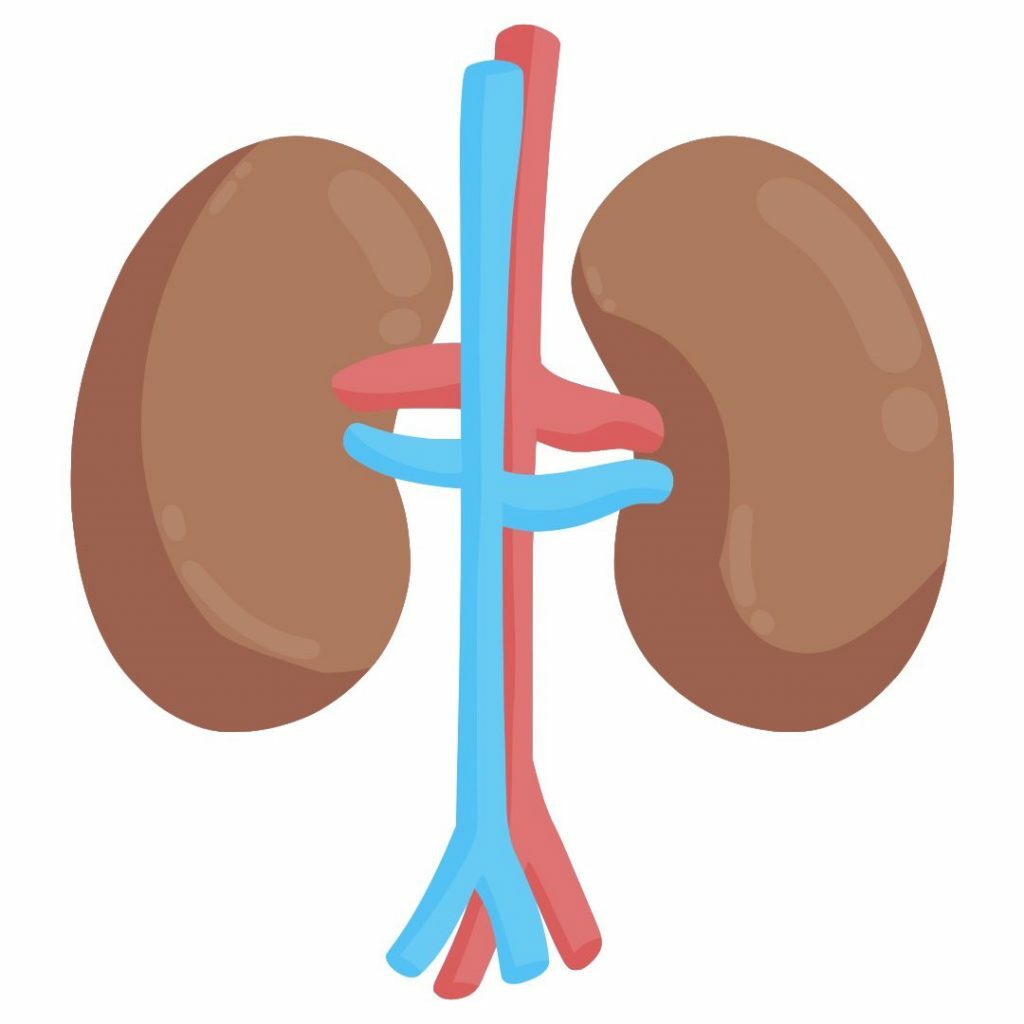What is Renal Disease?
Renal disease is a condition where the kidneys lose their ability to remove waste and excess fluids in the body. This condition leads to a dangerous buildup of electrolytes, wastes, and fluids in the body, causing further health complications. Chronic kidney disease affects 1 in 7 adults. That makes up an estimated 37 million people in the U.S. alone.
Your body needs clean blood to function properly. Kidneys filter waste products from your blood. When they stop working, waste and fluids begin to build up in your body, putting you at high risk for heart attack, stroke, and vascular diseases. If left untreated, the kidneys can eventually fail, leading to either relying on dialysis or having to receive a kidney transplant

The Kidneys
There are two kidneys within the body, one located on each side of the spine at the bottom of the rib cage. While relatively small, about the size of your fist, the kidneys are responsible for our body’s most life-sustaining functionalities. Not only do they work to keep your insides toxin-free, but they also turn this unwanted waste into urine and filter it through your bloodstream.
The kidneys regulate a majority of the body’s salt, potassium, and acid content, making them a crucial factor in our overall health. In addition, they also produce hormones that aide in red blood cell production, regulate metabolism, and keep other organs working properly. If your kidneys fail, you will have to undergo hemodialysis until you can get a kidney transplant.
Signs & Symptoms of Renal Disease
Signs and symptoms of renal disease develop gradually.
Additionally, renal disease can be difficult to diagnose as the associated symptoms are often mistaken for something else.
Therefore, consulting with your doctor regularly is crucial, especially if you could be at risk for developing renal disease.
Depending on the severity of your kidney failure, you may experience some of the following.
- Puffy Eyes
- Swollen Feet or Ankles
- Feeling Foggy
- Itchy, Dry Skin
- Hypertension
- Chest Pain
- Difficulty Breathing
- Nausea
- Vomiting
- Loss of Appetite
- Fatigue
- Difficulty Sleeping
- Abnormal Urination
- Weak Immunity
- Muscle Cramping
Renal Disease Risk Factors
Anyone can develop renal disease. However, there are a few characteristics that can put you at increased risk for developing renal disease. Being aware of these factors can help to keep you proactive about renal disease prevention.
Is the most common cause of renal disease. When your blood sugar is consistently high, glucose remains in the bloodstream instead of being processed into energy. Overtime, this can damage the kidneys and destroy their ability to filter waste in your body.
Another leading risk factor for renal disease, occurs when your blood pressure is consistently high. Similar to consistently high blood sugar levels, this causes severe damage to the kidney’s overtime. Additionally, hypertension can also be a symptom of renal disease, making blood pressure maintenance crucial in preventing kidney failure.
Race & Ethnicity also play a role in kidney failure. Although the reasoning is unclear, research shows that Black, Hispanic, and Native American people are at higher risk for renal disease.

Preventing Renal Disease
Once the kidneys have been damaged, the effects cannot be reversed. However, there are habitual changes you can implement into your everyday routine that can not only keep your kidneys healthy, but also improve your blood pressure, glucose, and vascular health.
All nicotine products can damage the kidneys. If you currently smoke and have kidney problems, quitting will help to strengthen the function of your kidneys.
Check out the CDC’s Quit Smoking page for more information.
High blood sugar makes it extremely difficult for the kidneys to do their job and is one of the leading causes of kidney failure. Blood glucose can be controlled through low-sugar diets and regular exercise. If you are diabetic, insulin medication may be needed to keep blood sugar levels under control.
Blood pressure levels that are consistently high can hinder the kidneys from filtering toxins. Inflamed arteries increase one’s risk of developing renal disease. To reduce the risk of hypertension, most people should aim to keep their blood pressure levels at or below 140/90.
Your body needs some cholesterol to digest food, build cells, and make hormones. However, if cholesterol levels are too high, it can damage the kidneys. Eating a healthy diet of lean meat, fruits, vegetables, and low sodium can help to keep cholesterol levels in check